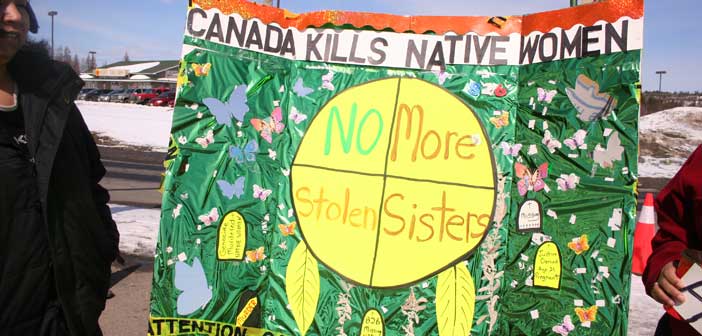ESPANOLA—Demonstrations and protests over the plight of more than a thousand missing and murdered Native and aboriginal women have been taking place across the country over the past couple of years, but the Wikwemikong chapter of the United Urban Warriors Society of Ontario decided to expand the scope of their five-minute blockade of the Highway 6 and 17 intersection at Espanola last weekend.
Twenty-two demonstrators gathered at the busy intersection to bring attention to not only the plight of Canadian Native women, but women across the globe.
“We decided to expand it not just for Native and aboriginal women, but for all women,” said organizer Izzy Pangowish of Wikwemikong. “We wanted to do something to bring attention to what is happening all around the world to women who are being abused, murdered and who have disappeared. We just want to do something about it.”
Mr. Pangowish said that the catalyst for the demonstration was the decision of the Harper government to not hold an inquiry into missing and murdered women across Canada. “The number went up to more than 1,126 two weeks ago,” he said, citing a recent report from the RCMP. That report by RCMP Commissioner Bob Paulson reported that police have compiled a list of 1,026 deaths and 160 missing-persons cases involving aboriginal women, a number hundreds higher than that previously cited in the media.
The decision to expand the demonstration to a global focus was in part a response to the plight of a group of 276 Nigerian schoolgirls kidnapped by the terrorist group Boko Haram in that country.
On the Monday following the protest, law professor James Anaya, the United Nation’s (UN) special rapporteur on indigenous rights, upped the ante in pressure on the Harper government with an official call for the government to conduct an inquiry.
The special envoy exhorted the federal government to “look into the disturbing phenomenon of missing and murdered aboriginal women and girls.”
[pullquote]“The federal government should undertake a comprehensive, nationwide inquiry into the issue of missing and murdered aboriginal women and girls, organized in consultation with indigenous peoples,” reads the report.[/pullquote]
“The federal government should undertake a comprehensive, nationwide inquiry into the issue of missing and murdered aboriginal women and girls, organized in consultation with indigenous peoples,” reads the report.
Mr. Anaya’s report was based on information he compiled after spending nine days in Canada last year meeting with First Nations representatives and government officials. He found that there is still a “well-being gap” between aboriginal and non-aboriginal people in Canada; that treaty and other aboriginal claims remain unresolved; and that aboriginal people have “high levels of distrust” toward all levels of government.
“Our government is proud of the effective and incremental steps taken in partnership with aboriginal communities,” reads a statement from Aboriginal Affairs Minister Bernard Valcourt in a government response citing the steps the federal government has taken to deal with the issue. “We are committed to continuing to work with our partners to make significant progress in improving the lives of aboriginal people in Canada.”
Opposition parties condemned the Conservative government’s decision to not hold an inquiry.
“If this were to happen to any other group in our society there would be a lot more attention, outrage, and government action,” said Algoma-Manitoulin-Kapuskasing MP Carol Hughes in a release on the issue of missing and murdered women. “I truly believe most Canadians are more concerned about this than the prime minister is, which is a real shame.”
Ms. Hughes said the government has to pay attention to the details of the special relationship with First Nations instead of trying to dictate how it will proceed. She said that she believes success will be achieved when the government starts listening and responding to the concerns of First Nations.
“The government seems set on picking legislative fights that only strain relations,’ said Ms. Hughes. “First Nations are telling us that a national public commission of inquiry into murdered and missing aboriginal women is an immediate priority and the government isn’t even listening.”
“This report clearly articulated both the serious and persistent crisis in outcomes for indigenous people in this country,” said Liberal Indian Affairs critic MP Carolyn Bennett, “and that the steps taken by the Conservatives have not only failed to address this crisis, but have created a high level of distrust towards the federal government.”
“The rapporteur also noted the lack of trust many indigenous people feel toward this Conservative government,” said New Democrat MP Jean Crowder in another statement. “Continuing to ignore calls for an inquiry into missing and murdered indigenous women only increases that distrust because people honestly don’t understand why they continue to ignore what amounts to a public safety emergency.”
Mr. Pangowish noted that the general public seems to support a formal closer look at the issue, although the media seems to be falling short.
“We got a lot of support from people driving by,” said Mr. Pangowish of the demonstration, but he was dismayed at the lack of attention from most media outlets. “CTV and the (MidNorth) Monitor were all told about the protest,” he said, “but we didn’t see any of them all day.”
Mr. Pangowish said that he was delighted with the number of people who came out to support the demonstration. “We had 22 people who came out to support the call for governments to protect women from abuse,” he said.




